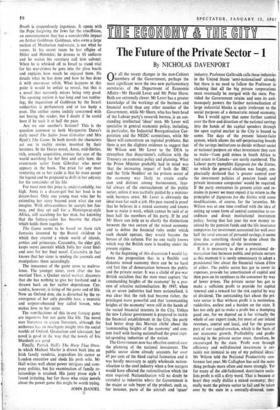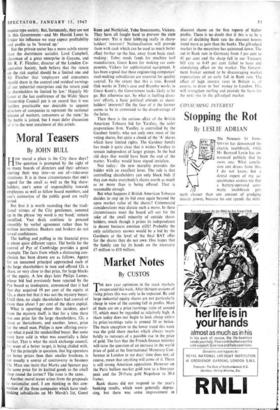The Future of the Private Sector — 1
THE EgeNtilf VROM Con
By NICHOLAS DAVENPORT
(NF all the recent changes in the non-Cabinet kjmembers of the Government, perhaps the most significant were the two new parliamentary secretaries of the Department of Economic Affairs—Mr Harold Lever and Mr Peter Shore. Both are extremely clever. Mr Lever has a greater knowledge of the workings of the business and financial world than any other member of the Government, while Mr Shore, who has been head of the Labour party's research bureau, is an out- standing intellectual 'ideas' man. Mr Lever will specialise in general economic policy, including, in particular, the Industrial Reorganisation Cor- poration and the NEDC committees, while Mr Shore will concentrate on regional problems. But there is not the slightest evidence to suggest that Mr Wilson sent Mr Lever to the DEA to strengthen that department's collision with the Treasury on economic policy and planning. What the Prime Minister probably had in mind was that the increasing impact of both the IRC and the 'little Neddies' on the private sector of the economy was likely to create confu- sion and distrust among businessmen, fear- ful always of the encroachment of the public sector, unless it was tactfully guided by a minister with business sense. Mr Lever is obviously the ideal man for such a job. His past record is proof that he believes in a mixed economy and knows how to make it work, which cannot be said of at least half the members of his party. If he and Mr Shore can help us to clarify the distinctions between the two sectors of the mixed economy and to define the financial rules under which, each should operate, they would become the heroes of this column. For no one really knows which way the British state is heading under the present regime.
At the beginning of this discussion I would lay down the proposition that in a flexible and dynamic mixed economy there can be no hard and fast line of demarcation between the public and the private sector. It was a cliché of pre-war British socialism that the state must capture `the commanding heights of the economy' by a pro- cess of selective nationalisation. By 1947, when six or seven industries had been nationalised, it was clear that the rich had become richer, the privileged more powerful and that 'commanding heights of the economy' were still in the hands of the vested financial interests in the City. Unless the new Labour government is prepared to tackle the financial establishment in the City, the party had better drop this Marxist cliché about the 'commanding heights of the economy' and con- tent itself with having nationalised the great capi- tal-spending industries of the nation.
The Government now has effective control over the planning of the national investment. The public sector alone already accounts for over 45 per cent of the fixed capital formation and it was hardly necessary to apply wholesale nation- alisation to the steel industry when a few mergers would have effected the rationalisation which the state required. Nationalisation will no doubt be extended to industries where the Government is the major or sole buyer of the product, such as, for instance, parts of the aircraft and 'space' industry. Professor Galbraith calls these industries in the United States 'semi-nationalised' already but there is no need to follow the Professor in claiming that all the big private corporations must eventually be merged with the state. Pro- vided the Government retains and uses its anti- monopoly powers the further nationalisation of large industrial blocks is quite irrelevant to the social purposes of a democratic mixed economy.
But I would agree that some further control over the flow and direction of the national savings into the hands of the capital spenders through the open capital market in the City is bound to come. The days of the present laissez-faire system, which allows the self-perpetuating boards of the savings institutions to decide without social or national purpose on what investment they care to make—from gold mines in South Africa to real estate in Canada—are surely numbered. The Labour party pamphlet Signposts for the Sixties, on which the general election was fought, em- phatically declared that 'a greater control over the investment policies of pension funds and private insurance companies' would be required. If the party overcomes its present crisis and re- mains in power we must expect it to return to the principles of Signposts for the Sixties with some modifications, of course, for the 'seventies. Mr Wilson was at one time credited with the idea of setting up some form of central committee to co- ordinate and direct institutional investment policy. Seeing that last year the new money re- ceived by the pension funds and the life insurance companies for investment accounted for well over half the total amount of personal savings, it seems time that something should be done about the direction or planning of the investment.
If it is necessary to draw a provisional de- marcation line between public and private sectors at this moment it is surely unnecessary to adopt a provisional line about the financial raison d'être of either. The public sector has got to cover its expenses, provide for amortisation of capital and then pass on its surpluses to the consumer by way of lower prices. The private sector has got to make a sufficient profit to provide for capital renewal and a reward for the risk capital by way of dividend. The outstanding fact about the pri- vate sector is that without profit it is motiveless, rudderless, useless and a burden on the state. It has not only got to make a profit but a thumping good one, for we depend on it for virtually the whole of our export trade, for most of our inland revenues, central and local, and for the greater part of our capital-creation, which is the basis of our economic growth. Profitability and profit- making in the private sector must, therefore, be encouraged by the state. 'Profit won through efficiency and well-directed investment is cer- tainly not inimical to any of my political ideas,' Mr Wilson told the National Productivity con- ference last year. Mr Callaghan has said the same thing perhaps more often and more strongly. Yet for many of the old-fashioned, doctrinaire socia- lists profit is still a dirty word. That is because at heart they really dislike a mixed economy; they really want the private sector to fail and be taken over by the state in a centrally-directed, corn-
munist-type society. But, fortunately, they are not in this Government—and Mr Harold Lever is. Under his influence we may expect profitability and profits to be 'levered up.'
But the private sector has a more subtle enemy than the doctrinaire socialist. Lord Campbell, chairman of a great enterprise in Guyana, and Mr R. F. Fletcher, director of the London Co- operative Society, both believe that the return on the risk capital should be a limited one and Mr Fletcher that 'employees and consumers should share in the control and residual earnings of our industrial enterprises and the return paid to shareholders be limited by law.' Happily Mr Lever at the last conference of the Wider Share Ownership Council put it on record that it was 'neither practicable nor desirable to appoint directors of companies to .represent the sectional interest of workers, consumers or the state.' So the battle is joined, but I must defer discussion of it to the next instalment of this article.































 Previous page
Previous page